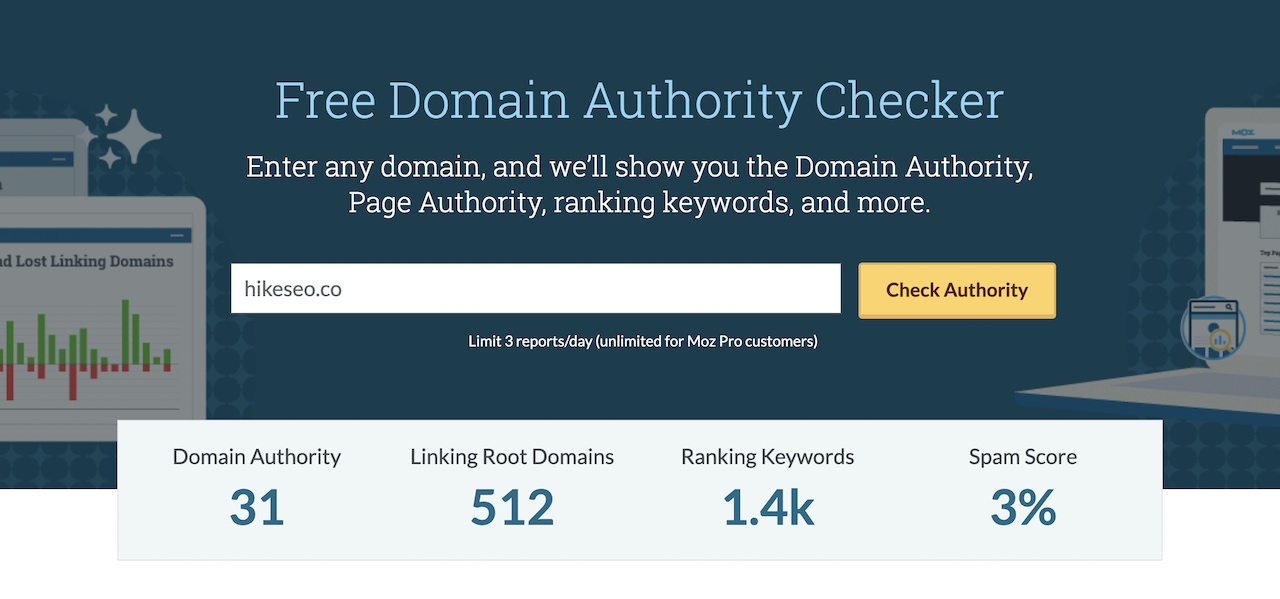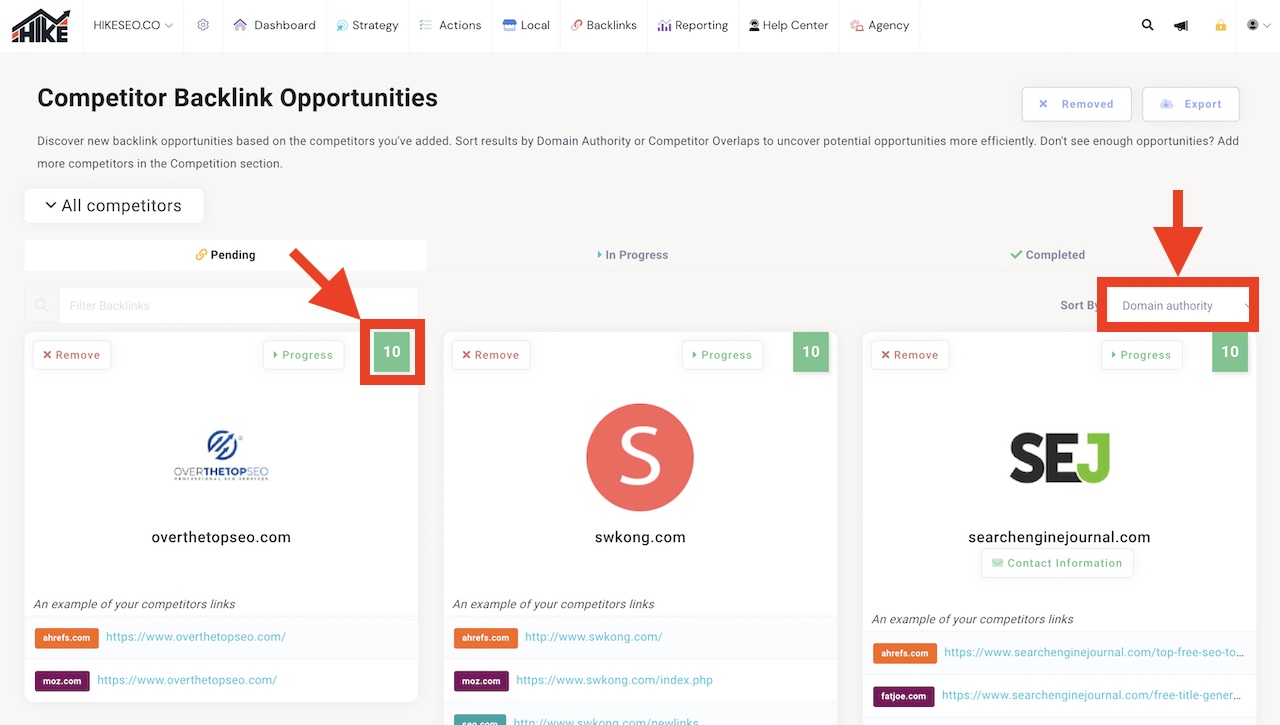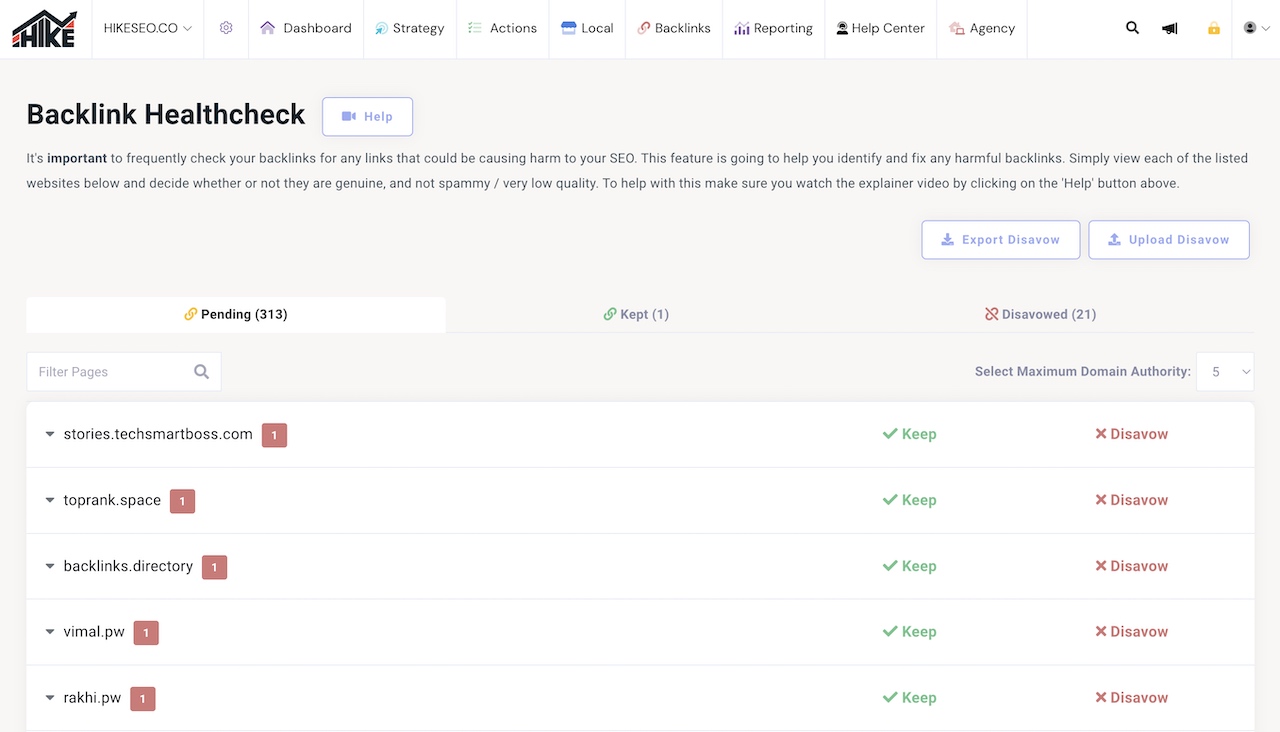Domain Authority: A Beginner’s Guide
What is Domain Authority?
Domain Authority (DA) is a metric developed by Moz that predicts how well a website will rank on search engine result pages (SERPs). It's measured on a scale from 1 to 100, with higher scores indicating a greater potential to rank.
Many factors such as the number of quality backlinks pointing to a site, the website’s overall trustworthiness, and its relevance in a particular industry or niche all are considered when determining the DA score.
For example, Hike SEO at the time of publishing this article had a DA score of 31 out of 100.

Why is Domain Authority Important?
Domain Authority can be a useful metric to provide insight into a website's potential performance in search rankings, however, it’s just a tool for benchmarking and not a factor that search engines (i.e. Google) use for ranking. That being said, a correlation between DA and SERP ranking has been found in a study.
Benchmarking
When you have the DA scores of multiple domains, you can use it as a valuable benchmarking tool to compare the relative strength of different websites within the same niche or industry. This is useful when looking at your competitors and seeing how hard it will be to compete against them in search engines. It enables businesses to set realistic goals for improving their online visibility and competitiveness.
Backlink Prospecting
Domain Authority can also be helpful when identifying potential backlink opportunities. Websites with higher DA scores typically indicate stronger authority and credibility in their respective fields. This means when evaluating backlink prospects, prioritizing websites with higher DA can be advantageous as these links can positively influence a site's own authority and search engine rankings.
Remember, it's essential to prioritize quality over quantity and focus on obtaining backlinks from relevant and authoritative sources to positively impact SEO efforts.
How is Domain Authority Calculated?
Domain Authority (DA) is calculated using a proprietary algorithm developed by Moz, on a one to 100 logarithmic scale. While the exact specifics of the algorithm are not disclosed to the public, various factors are considered to determine a website's Domain Authority which likely include the number of linking domains, the quality of those links, traffic flowing to those domains, and other factors such as proprietary trust scores.
How To Check Domain Authority
A website’s domain authority can be checked through Moz’s Link Explorer tool, or using a third-party Website Authorither Checker tool.
Hike SEO also has its own version of the domain authority, the only difference is that the score is out of 10 instead of 100. In Hike’s Competitor Opportunities tool, you can see all of your competitors’ backlinks and each one has a domain authority score to allow you to quickly gauge its authority at a glance.
For example, below you'll see Hike's authority score (out of 10) in the top-right corner of each domain opportunity. These opportunities are by default sorted by authority from highest to lowest, so you can quickly spot the best ones.

How Often Should I Check My Domain Authority?
Good question! Because domain authority is a metric that takes time to change, it would be advisable to check at most once a month. This ensures that any backlinks that have been created during a 30-day period have time to be picked up and influence the DA of your site.
What is a Good Domain Authority Score?
Domain Authority is best used in context and not as an absolute measurement of authority. It’s most useful when comparing your own website to your competitors in the same niche or industry, so you can see how much DA you have in relation to them. Having less DA than your competitors simply means that it may be harder to rank for keywords that your competitors are ranking for, however, having a higher DA than your competitors indicates that it could be a lot easier to gain visibility over your competitors in the SERPs.
Brand new websites with domains that have no previous histories start out with a DA of 1 out of 100. By securing high quality and authoritative backlinks, this score can start to increase over time.
DA scores between 40 and 50 are generally considered average. Scores between 50 and 60 are good, and a DA above 60 is considered excellent. Remember, the score is calculated using a logarithmic scale, which means it’s much harder to go from 50 to 60 than from 20 to 30, for example.
Ultimately, remember it’s not the absolute score that matters, it’s the context and how your DA relates to your competitors that matters!
How To Increase Domain Authority
There’s no quick or easy way to boost your domain authority. It takes consistent effort, patience, and finding the right link opportunities. It’s never about just the number of links, it’s the quality of the links that are secured that matter. Below are some general tips on best practices to increase your domain authority:
Quality over Quantity
DA is not something you build quickly, but rather through making sure that the links that you do get are of high quality, relevance, and have credibility in your industry. Of course, the more quality links you receive, the better, but always focus on quality first.
Analyze Backlinks
Before attempting to secure a backlink from a website, make sure to do proper analysis of the domain to make sure it’s a trustworthy and authoritative source to link from. Look at the domain authority, the industry it’s in, the quality of the content, social media activity, traffic, and other indicators that give confidence in the quality of the website.
Analyzing your existing backlink profile is also important, to flag up any suspicious or low quality backlinks that would be better removed than be associated with. If removal is not possible, then disavowing that link or domain can be an option as last resort.
For example, below you'll see Hike's Backlink Healthcheck tool that flags up any backlinked domains that have an authority score of 1 out of 10. These can be then reviewed to spot any spammy links that require removal or disavowal.

Create Quality Content
Creating high quality content that adds value to the target audience and is worth linking to automatically creates a strong foundation to encourage visitors to link to that page or website. This generates additional backlinks from real sources that can build domain authority naturally over time.
To get an idea of what the quality standards for content is, have a look at your competitor’s content. How in-depth do they go? What points within that topic do they cover?
Compare Your Site To Your Competitors
Domain Authority should be used to measure your authority or ranking strength in relation to your competitors. Just because you have a DA of 15 doesn’t mean it’s bad - your competitors all could have DA scores of less than 15, which means your domain authority is quite good in comparison. Always view DA in context!
See Where Competitors Get Their Backlinks
Using tools such as Hike SEO can help you view backlinks that your competitors have secured, giving you X-ray vision into potential opportunities for your website. Spotting websites that overlap with backlinks to multiple competitors is a clue that this could be an easier opportunity to link from, as it has linked to multiple websites in the same industry or niche.
If you’re curious to learn more about backlink building strategies, make sure to check out our article for more ideas.
Why Does Domain Authority Change?
Domain Authority can fluctuate over time simply because of the dynamic nature of the web. Links are constantly being added, removed, and changed, so as the backlink profile of a domain changes, so does the domain authority. Sometimes backlinks are removed and that could result in a drop in domain authority. Other times, new backlinks are added and this could increase the DA of the site. Every backlink influences the DA score, however small, so the cumulative impact of all the backlinks combined can affect & change the score over time.
Domain Authority vs. Page Authority
You may have already heard of Page Authority (PA) and wondered what the difference is to DA. Domain Authority measures the probability of ranking an entire web domain while Page Authority measures the probability of ranking of each of the pages individually.
This means pages on the same domain can have different Page Authority scores, and pages with higher PA scores could rank better than those with lower PA scores. Page Authority is influenced by the quality and number of links that point to a specific page, while Domain Authority takes into account all of the backlinks across the entire domain.
Hike + Domain Authority
By using an all-in-one SEO platform like Hike, you can use its beginner-friendly tools to view your backlink profile and the authority of each of those websites. You can also view your competitor’s backlinks and see how authoritative each of the links are, and if there are any overlaps between the competitors.
If you haven’t yet tried Hike, sign up today and see how easy it is to become empowered to take control of your SEO.